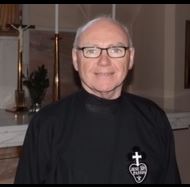Today is the morning after the close of the Novena to Our Lady of Sorrows. It was a very blessed time for all of us and we are so glad we decided to have it this year, after only being able to do it online last year. The Novena to Our Lady of Sorrows has been running for more than 50 years in St. Mungo’s. It was begun by the then rector, Father Pancras Fanning, who presented it as a short 10-minuite reflection after the evening Mass for the nine nights up to, and including the Feast. Over the years it developed into the format we have now. There is at least one person in the parish who was present when the Novena began, and has been present at every novena ever since. We hope and pray that this tradition will continue for many years to come, which I am sure it will, so long as there are Passionists to serve in St. Mungo’s, and that is something we need to constantly pray about, as our average age increases, and our number of active religious decreases, in these difficult times. We need Passionist vocations.
That, of course, is why our Provincial and his Council have such a difficult task in making appointments after the Chapter, which is what they are in the process of doing right now. They are in the final two days of meetings and, by this weekend they would hope to have completed their task. In St. Patrick’s Province we have our mother house at Mount Argus in Dublin; a rural monastery in Enniskillen; a parish in Belfast; a retreat house in County Down; a parish in Paris, and of course, a parish in Glasgow. When I say parish, as we are a religious order, our ministries do not confine themselves solely to parish work, and there will be a number of religious in those locations who are engaged in other ministries too. All of those places need to have leadership – rectors; vicars, bursars, parish priests, assistant priests and so on. There will also need to be people appointed as vocations directors, novice masters, and student directors – what we call the work of Formation. We also have various chaplaincies to look after – a hospice in Dublin; the Gardi (Irish police); as well as colleges and universities. We are engaged in media work; counselling; preaching missions and retreats; and spiritual direction. We manage two pastoral centres. We try to look after our frail and elderly men in their own communities for as long as is feasibly possible. On top of that, the Provincial and his Council will be looking to set up a number of task forces to assist the areas of mission that were prioritised at the Chapter. And, even all that, does not exhaust the list. Inevitably, in these times, anyone who is active will end up wearing a number of hats and have to engage in a variety of ministries and, with regard to any thoughts of retirement, most of us will die with our boots on, and are willing to do so. However, one area of priority is to engage more and more with those laity who are involved with us in our charism and mission, and to find ways in which we can work together to keep doing what we have been put in the church to do, which is to promote the memory of Christ’s Passion as the greatest and most overwhelming expression of God’s love for us. By the time of the next Father Frank’s Log, all of the main appointments, and how they affect St. Mungo’s, will be known – so, watch this space!
Today, the day after the Novena, is also the Feast of St. Ninian. An occasion like a Novena heightens our appreciation of the faith that we have received from those who handed it on to us, and St. Ninian was among the first, if not the first, to do that. He arrived at the Mull of Galloway, towards the end of the 4th century, possibly with 12 monks gifted to him by St. Martin of Tours, whom he visited in France on his way to Scotland from Rome. Together, they achieved so much with so few, and that, today, gives me hope. I have twice visited the cave where he found space for prayer and contemplation away from distractions – beautiful!
As always, protect yourself, your loved ones and others, and protect Christ in your lives.

 RSS Feed
RSS Feed
